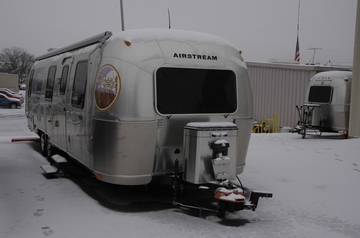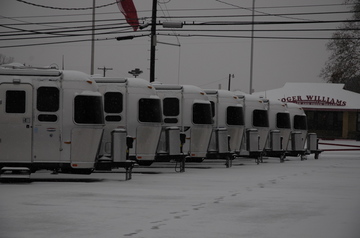Now all you northern readers don’t have to feel bad about our fun in the sun and warm weather down here in the south — because there isn’t any of either in Texas! We woke up this morning to an inch of fresh snow and more coming down. The guys here at the dealership say they haven’t seen snow here in years, and certainly not two back-to-back storms like the area has had this week.
Of course we were completely comfortable in the trailer last night. I mention this only because a lot of people ask us if our trailer is insulated. Of course it is. Temperatures in the 20s are no big deal. So if you want to go camping in sub-freezing weather, go right ahead. Your Airstream is built to take it. All the water tanks are heated by the furnace, and there’s no need to “dry camp” as long as you can find an open dump station in the winter.
Today, technician Denver Russell has towed our trailer into the shop for our systems check, and a few upgrades. I’ll be documenting everything we do over the next couple of days … because we aren’t going anywhere while the roads slippery.




January 17th, 2007 at 7:12 pm
Thanks for answering a question I have had for a long time about using the Airstream in cold weather. You suggest that 0 degree (F) might be the minimum for the hold tanks. Is that figure based on experience or have you found any hard data?
Love the blog and Airstream Life.
January 17th, 2007 at 7:29 pm
Doug, the zero degree figure is just a wild guess. I would bet around there, or in the single digits, the furnace would run constantly, which indicates the maximum heating capacity inside the trailer without ancillary heaters.
January 17th, 2007 at 7:38 pm
Rich, it’s about 25 F here with an inch of snow and ice and we are 1400 miles north of you in Canada!
At least yours will go away in a few days.
Doug
January 25th, 2007 at 1:28 pm
First off, I agree that folks are often too quick to “winterize” their RV’s at the first sight of fall. But I think that it is important to communicate a few things that can make “wet” cold weather camping difficult / something to be attempted only under the right circumstances. I have some experience with these issues (we use the Westy as a “ski lodge”, etc.) and want to share that experience. Here goes:
1. If one is driving from warm (above freezing) to cold (below freezing) and back to warm the temperatures below freezing that can be attempted can be even lower.
2. If one is staying in cold (read as below freezing from here forward) for a short time one can attempt even colder temperatures. In other words, the longer you will be in cold temperatures the less cold those cold temperatures can be.
3. If one is returning to warm (read as above freezing from here forward) temperatures from cold, the higher the warm temperatures are the colder the cold temperatures can be (and if one is also traveling from higher warm temperatures then I would suggest you can travel to even colder safely).
4. The longer distance / time / greater speed one travels in cold temperatures, the shorter time one can spend in those cold temperatures.
All of the above comes from the following:
1. You may be able to keep the tanks contents from freezing (via furnace or whatever) at a given cold temperature but you may not be able to keep the drains/ outlets from those tanks from freezing at that same cold temperature. In other words, given that the drains/ outlets are necessarily more exposed to the elements (if they were not more exposed then we would have trouble accessing them easily in order to use them).
2. If one does not return to warm enough temperatures, you will not be able to use the drains/ outlets until the temperatures rise or you can move your RV to a heated garage or you can somehow spot heat those drains/ outlets.
3. In summary, if your drains/ outlets are frozen it doesn’t matter if the contents of their tanks are not frozen – it’s going to be awfully hard to drain/ empty those tanks through their frozen “plugs”. (Some folks will use a hair dryer to unfreeze the drains/ outlets – it can be done but just remember that you will need to have household current at the dumpsite in order to make this work!)
I have experienced this first-hand on a few occasions. Once I was traveling from the south to the north as winter was starting up. I waited longer than I should have (and drove at high speeds on the highway just) prior to dumping my black and grey tanks. My tanks were still liquid but I could not easily dump them through the frozen “plug” that had developed in my septic outlet. It was downright difficult to just get the cap off the septic line under these circumstances. Another time I got home from further north of home to find temperatures unseasonably cold at home in Lincoln (below freezing after it should have been easily above). I then had to keep running my furnace for a few days to avoid damage until things warmed up enough for me to dump my tanks.
A heated garage that fits my Westy (pretty rare bird . . .) would help but there would still be circumstances based on my numbered points above that would keep me from “wet” cold weather camping.
Zach